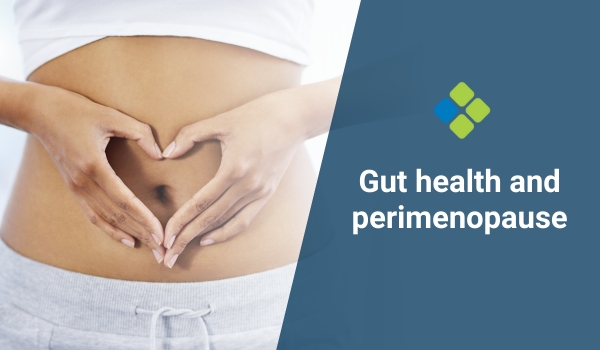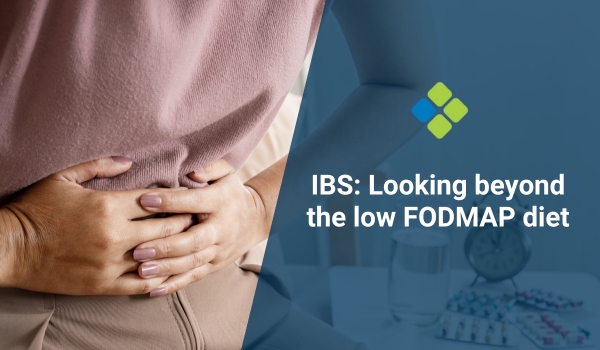Uncovering the microbiome: prebiotics, probiotics & postbiotics
Learn how GPs can use gut modulators (prebiotics, probiotics and postbiotics) to improve and maintain gut health for their patients.

HealthCert Education
The composition of our gut microbiota changes throughout our lifetime based on our environment, the foods we eat, our lifestyle, medications, and more. Patients' dietary choices can have a significant influence on the health of their gut which in turn can impact their overall health. Prebiotics, probiotics, and postbiotics all help to regulate the microbiota and bring about health benefits, and although they sound similar, they all exert different effects!
Learn more about the microbiome in the HealthCert Professional Diploma program in Medical Nutrition Management - online nutrition training for GPs.
Prebiotics
A prebiotic is a substate that is selectively utilised by host microorganisms and confers a health benefit [1]. While prebiotics can be a type of fibre, they can also exist as polyphenols, unsaturated fats, and resistant starches.
Prebiotics ‘feed’ gut microbes, helping to modulate the gut microbiota. When prebiotics are fermented by gut microbes, they produce beneficial short chain fatty acids (like butyrate) which helps to improve nutrient absorption, regulate blood sugar, reduce inflammation, improve digestion, and strengthen the immune system [1,2,3].
Prebiotics can be found in Jerusalem artichokes, raw onion and garlic, green unripe bananas, asparagus, oats, barley, rye, and asparagus among other foods. It’s recommended to have between 5g-20g of prebiotic fibre a day [1].
Probiotics
Probiotics are live microorganisms that confer a health benefit on the host when administered in adequate amounts [4].
Probiotics have been extensively studied in their role in gut health and overall health. Various strains have been shown to beneficial when administered in sufficient amounts for certain conditions including antibiotic associated diarrhoea, irritable bowel syndrome, inflammatory bowel disease, bacterial vaginosis, constipation, migraine prevention, helicobacter pylori, symptoms related to stress and anxiety, and more [5]. The US Probiotic guide is a clinical evidence-based guide that outlines what probiotic strains have certain applications and in what dosage [6].
Postbiotics
While you may be familiar with prebiotics and probiotics, the term ‘postbiotic’ is a lesser-known gut modulator. They’re also often defined incorrectly as the by-products of our gut microbiota. From the International Scientific Association of Probiotics and Prebiotics (ISAPP)’s definition, a postbiotic is a preparation of inanimate microorganisms and/or their components that confers a health benefit on the host [7]. This means that microbe-derived substances (like short-chain fatty acids) aren’t actually considered postbiotics.
From a clinical perspective, postbiotics may be useful in preventing upper respiratory tract infections, gastroenteritis, improving gut symptoms, reducing inflammation, improving allergy symptoms and improving mental health, but more research is needed [7,8,9].
Another benefit of postbiotics is the safety of their use. Since postbiotics are inanimate, they can’t cause infections and may be safer for vulnerable populations, they are likely to be more shelf-stable than probiotics and may be an appropriate alternative for application in medical practice [10]. Some fermented infant formulas have postbiotics, and there are also postbiotic supplements that have been developed, although they are not widely available (as of yet).
Prebiotics, probiotics and postbiotics have proven benefits when it comes to improving or maintaining good gut health. By developing a robust understanding of the clinical implications of each, GPs can selectively use these gut modulators to improve the health of their patients.
Learn more about this topic in the online Professional Diploma program in Medical Nutrition.
- Sarah Marko, Accredited Practising Dietitian
References
[1] Gibson GR, Hutkins R, Sanders ME, Prescott SL, Reimer RA, Salminen SJ, et al. Expert consensus document: The International Scientific Association for Probiotics and Prebiotics (ISAPP) consensus statement on the definition and scope of prebiotics. Nat Rev Gastroenterol Hepatol 2017. https://doi.org/10.1038/nrgastro.2017.75.
[2] Krumbeck JA, Maldonado-Gomez MX, Ramer-Tait AE, Hutkins RW. Prebiotics and synbiotics: Dietary strategies for improving gut health. Curr Opin Gastroenterol 2016. https://doi.org/10.1097/MOG.0000000000000249.
[3] Li HY, Zhou DD, Gan RY, Huang SY, Zhao CN, Shang A, et al. Effects and mechanisms of probiotics, prebiotics, synbiotics, and postbiotics on metabolic diseases targeting gut microbiota: A narrative review. Nutrients 2021. https://doi.org/10.3390/nu13093211.
[4] Hill C, Guarner F, Reid G, Gibson GR, Merenstein DJ, Pot B, et al. Expert consensus document: The international scientific association for probiotics and prebiotics consensus statement on the scope and appropriate use of the term probiotic. Nat Rev Gastroenterol Hepatol 2014. https://doi.org/10.1038/nrgastro.2014.66.
[5] Sniffen, J. C., McFarland, L. V., Evans, C. T., & Goldstein, E. J. C. (2018). Choosing an appropriate probiotic product for your patient: An evidence-based practical guide. PloS one, 13(12), e0209205. https://doi.org/10.1371/journal.pone.0209205
[6] Skokovic-Sunjic,D. Clinical Guide to Probiotic Products Available in USA. Applications, Dosage Forms and Clinical Evidence to Date - 2023 Edition. http://www.usprobioticguide.com/PBCAbout.html?utm_source=site_links&utm_medium=civ&utm_campaign=USA_CHART
[7] Salminen S, Collado MC, Endo A, Hill C, Lebeer S, Quigley EMM, et al. The International Scientific Association of Probiotics and Prebiotics (ISAPP) consensus statement on the definition and scope of postbiotics. Nat Rev Gastroenterol Hepatol 2021. https://doi.org/10.1038/s41575-021-00440-6.
[8] Nishida, K., Sawada, D., Kuwano, Y., Tanaka, H., & Rokutan, K. (2019). Health Benefits of Lactobacillus gasseri CP2305 Tablets in Young Adults Exposed to Chronic Stress: A Randomized, Double-Blind, Placebo-Controlled Study. Nutrients, 11(8), 1859. https://doi.org/10.3390/nu11081859
[9] Andresen, V., Gschossmann, J., & Layer, P. (2020). Heat-inactivated Bifidobacterium bifidum MIMBb75 (SYN-HI-001) in the treatment of irritable bowel syndrome: a multicentre, randomised, double-blind, placebo-controlled clinical trial. The lancet. Gastroenterology & hepatology, 5(7), 658–666. https://doi.org/10.1016/S2468-1253(20)30056-X
[10] Rad AH, Abbasi A, Kafil HS, Ganbarov K. Potential Pharmaceutical and Food Applications of Postbiotics: A Review. Curr Pharm Biotechnol 2020. https://doi.org/10.2174/1389201021666200516154833.

 1800 867 1390
1800 867 1390

